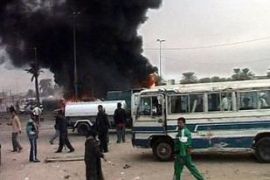Iraq’s Sadr bloc in Bush protest
Shia leader’s men suspend role in government over al-Maliki’s planned meeting.

Suspension
The group handed the statement to reporters in Baghdad’s Shia district of Sadr City, where a series of bombings last week killed more than 200 people in the deadliest attack in Iraq since the US-led invasion.
The statement read: “At a time when Iraqis are suffering and the popular and national desire yearns to get rid of the occupation and the forces of darkness and takfiris [Sunni radicals] that kill without distinction… the Sadr bloc decided to suspend its participation.”
US pressure
The Sadrists’ move to suspend their participationi in al-Maliki’s fragile coalition government further complicates the meetings between the Iraqi leader and Bush.
|
“The reality… suggests Maliki is either ignorant of what is going on… or that his capabilities are not yet sufficient to turn his good intentions into action” Stephen Hadley, US national security adviser |
Bush hopes to use his meeting with al-Maliki to find a way to reduce the sectarian violence sweeping Iraq.
He also wants Iraqi security forces to play a greater role in combatting the Sunni insurgents in the country’s western Anbar province, and thereby allow US troops to withdraw.
In recent days Bush has vowed not to pull troops out “before the mission is complete”, rejecting talk that Iraq had plunged into civil war – a term adopted by several US news outlets.
However US misgivings over al-Maliki’s leadership have been disclosed in a memo written by Stephen Hadley, a national security adviser, and which were published by the New York Times.
According to the 8 November document, Hadley told Bush that al-Maliki’s leadership had been weak.
It read: “His intentions seem good when he talks with Americans, and sensitive reporting suggests he is trying to stand up to the Shia hierarchy and force positive change.
“But the reality on the streets of Baghdad suggests Maliki is either ignorant of what is going on, misrepresenting his intentions, or that his capabilities are not yet sufficient to turn his good intentions into action”.
The report advocated a possible shake-up of his seven-month-old national unity government.
Regional problems
Al-Sadr’s boycotting of the government will also undermine Jordan’s hopes that the talks could be used to address wider regional problems.
Jordan’s King Abdullah II had hoped to use the summit to urge Bush to find a solution to the Israeli-Palestinian conflict.
Hoda Abd al-Hamid, Al Jazeera’s Iraq correspondent, said: “[Abdullah] has said without solving the Israeli-Palestinian problem you cannot bring stability to the region and has warned the Middle East is on the verge of three civil wars [in Iraq, Lebanon and the Palestinian territories].”
Prior to Bush’s visit, around 300 people carrying Jordanian flags and anti-Bush banners marched through the University of Jordan on Wednesday afternoon.
One demonstrator held a sign that read: “You are not welcome in Jordan. You have our children’s blood in your hands.”
The protest was organised by students affiliated with the Jordan’s Muslim Brotherhood – the country’s largest opposition group.